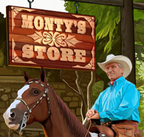When I try to offer new perspectives on old fashioned, painful training methods, or on typical methods of punishment, I hear rationalizations to “prove” that horses don't feel pain the way I think they do.
For example, I have been told that if a horse does something wrong (while standing in the aisle), one proper response may be to punch him sharply in his lower barrel with the knee so that he flinches. This response supposedly does not hurt or inflict pain; instead, the will generally recognize this as a form of "No" and respect it as such.
This example falls under the general category of believing horses don't feel pain the way we think they do. How the reasoning gets there is not entirely clear to me - something about, horses have thicker skin than we realize, they don’t *like* the punch, but it doesn’t hurt. Plus something about, many typical horses do not show they are responding to such treatment with any lack of trust, so it can’t be wrong to punch like that.
If anyone here can provide a scientific basis for proving that horses do in fact feel pain with things like punches, or slaps, or chains, that would be so helpful. I personally don't need that kind of info to prove the point, but many people who love their horses seem to have difficulty grasping this. I would like to be able to take apart the underlying basis of the assumptions.
There are other examples I would like to ask about but perhaps taking them one by one is best.
Thanks.




Horses are flight animals, so it is in their nature to conceal any signs of pain and suffering. When predators are hunting for prey, they usually attack the sick or injured animals first.
I'm guessing that the people who say that "horses don't feel pain" have just made the wrong conclusions because horses do not *show* signs of pain. In order to survive, any flight animal tries to conceal signs of pain as long as possible. Horses are masters at this, as well as rabbits for example.
A horse's skin is a very sensitive organ, and he/she can even feel a fly landing on it. Just take a look at horses during summer time, they're generally bothered by the flies and insects even if the flies even hadn't started to "bite" at the horse yet.
Kicking or punching a horse is definetly not good horsemanship. I'm not sure if you can convince the "wrong-doers" to let go of this habit right away, but you could try to convince them that even lighter touches are enough. You might be able to challenge them to test how little force they should use - and maybe they'd be amazed to see that they don't need to punch, they could instead just lightly touch the skin of the horse?
PeteAndJack, that's good information, but if I role-play the response I expect, it's something like, "Your idea that horses conceal pain is just as valid as my idea that they aren't feeling it to begin with; we're both drawing conclusions from experience and I have to go with mine." So then where do I go? I have not heard/read results from Monty's training effort that involved monitoring the physiological vital signs of horses during training. I wonder if there are resources available yet, and whether the experience of Pain was identified anywhere. Could be tricky, I think. I stumbled onto a YouTube of a Russian Dressage person, don't know him/her, don't know much at all, but this person does dressage without a bit, and there is a graphic of how a bit inflicts pain as part of the reasoning to train bitless.
http://www.youtube.com/watch?v=PMfcc0hzGMU
The videos of riders severely yanking their horses mouths as discipline, are easy to target as causing pain. But to argue the use of NO bits, I'm not sure one could win the case that any pressure from a bit causes pain. It's back to the question of, how do you prove that? I hope others find this a useful discussion.
I watched monty live and he put a heart rate monitor on a horse whilst trying to teach it to load into a truck. The heart rate went obviously high when the horse felt threatened or scared. There is proof that heart rate usually rises when in pain ( look at human for example, if you step on a pin, you usually jump or lift the foot high, after woods you can feel adrenalin or high heart rate and a hell of alot of pain :D ) Once monty worked with the horse with the dually halter and using his methods the heart rate was low,calm and i think any intelligent person could conclude that with a low heart rate/calm demeanor that the horse will not only learn quicker (montys lesson of learning up/pain down) btu is also happier with what is going on, and surprise surprise, loaded every time!
I dont know if that helps or not, but hopefully people will realise that inflicting any violence to anything is unnecessary.
I think the bit thing is, i again take a leaf out of monty book, ' more to do with the hands that hold it' if you are gentle, concise and respectful of your animals, then they should be more willing to reciprocate such behavior :)
I can't remember if I read this in Monty's book or from his Q and A a long time ago, or perhaps heard it from one of his videos, but I recall him saying that there do exist wild herds of horses that are dysfunctional with alot of infighting among them and that these herds break apart quite readily. To me, this is like the people who handle their horses this way - fighting them all the time - it works, but not very well. Then they get into problems where they have to use more force and the team breaks apart. Maybe these people who feel they have to be rough with their horses have horses who have lineage back to these dysfunctional horse herds.
Louisethep, you do not have to convince me at all, I'm all there with you. I don't think the people who claim horses don't feel pain like we say they do, would disagree either. Some of what's tricky about this is, differentiating between pain versus fear or anxiety, and between good stress and bad stress (appropriate and inappropriate). When we desensitize a horse to a plastic bag, the horse will likely feel (appropriate/titrated) fear. I speculate that those who defend punching a horse in his barrel as "discipline" would claim the horse is feeling the same kind of angst as the horse with the plastic bag. Maybe another way to get at this is, during the loading practice, the horse's heart rate went up. During a punch in the barrel, the heart rate will go up. If it's okay in the first example, why not the second? Again, I don't have to be convinced. To me it's cut and dry that the latter is inappropriate. I may be missing something obvious, but being able to say, "That inflicted pain goes too far," needs more justification that observing an increased heart rate. Thank you for trying to work this out, I'm finding all of the comments so helpful.
EvyG, I would love to know the source of the description of these dysfunctional herds. Do you recall what the "infighting" looked like? Many many people who defend traditional yet painful punishment methods, would deny they are "fighting them all the time" or being "rough". They would say they are using calm discipline. This is partly why the discussion is so knotted up to me, I'm not sure how to talk intelligently to someone who holds this position on the nature of pain.
Well this would be a good question to pose to Monty Roberts himself. If I did not get this info from something Monty published, maybe it was from some wildlife documentary on wild horses...I just can't remember. I am also interested if anyone can answer your question - if it actually can be rationally answered to folks using traditional methods. I am looking forward to the revelation of the science trial information.
Saying that maybe people dont understand that they shouldn't beat the horses because of dysfunctional horse herds is like saying that maybe if the husband isn't able to understand he shoudn't beat up his wife it's because of her disfunctionnal family.
Gwen, I am reading this discussion and a lot of questions, comments and answeres are coming up into my mind. I can understand your strong wish or attempt to have an intelligent and scientific answer ready for people you observe punishing their horses the way you described it. For the scientific answer about the sensitivity of the horses skin I would answer the same as already done in here: horses have a much more sensitive skin then humans. A ganglion (net) of nerves lyes under the the skin of horses and lets them feel everything much stronger than we can feel it. For bits and equipment it would be Monty's so often repeated quote: every peace of equipment is just as good as the hands that hold it" This is true as much for the Dually we are using as for any other equipment. and - much stronger: no one has the right to say "you must" or I will hurt you. I am convinced you have told people who pump or even kick their horses bally that this will not bring any improvement etc. You see, theses people have a) no better idea or b) hit humans in their social comunity too. So they just don't know better and are not quite receptive for critical words about it. I have seen once in my life a horse who gave up on his live and just wanted to die because it has been beaten continously by four socalled trainers. One of them is trainer in the stable I work with horses. I have been standing there and couldn't say a word, just later I addressed one of them asking if she was convinced that would be the right way ? answer: if you have a better idea - go ahead, I tryed everything else I could think of. This is long ago and I had little experience. Today seeing a scene like that I would be in the arena in a second stopping that scene first with words and if nessecary with action. But: I made the experience that showing the people around how much I can achieve WITHOUT any kind of violence with the horses I work with is what they keep in mind and what step by step convinces them. The only other thing I can think of is that you could tell them that scientists and Monty have proved with heart rate and other facts that race horse are not only not becoming quicker if they are beaten up on the last meters but that they even become slower. This results made the exclusion of the whip in certain race tracs possible ! Some people just understand things if you give them examples of this kind. EvyG is right, the revelation of the science trial will give a lot of answers and good points how to respond if we see brutality or cruelty. I am looking forward to read your comment !
I have been distracted from this thread by the recent public response to a video of Linda Parelli's handling of a horse that was posted on the net. I'm trying to digest what I'm reading in her blog where she responded to the initial criticisms. Currently there are 435 comments, and they are amazing to read, they say so much about what people think of "raising the energy to a dangerous horse," what is painful and what is not, what horses do "to each other" in the herd. I'm a bit drowning in it all. I think it would be good for those of the Monty Roberts persuasion to have a look-see. Much of what commenters write reflects the big wide world of training methods generally, and they are so intense to read. I'm going to post another thread with a better topic, and return to this thread in a while.
Has anyone read Mark Rashid's book "horse's never lie" ? I found it very eye opening and one point he found was he had some horses who lead by fear. These horses (very similar to one at our yard at the moment) attacked other horses, if it wanted water pushed them off, pushed them off food etc, bit and kicked. If I remember rightly the herd preferred the leadership of what he calls a "passive leader" one who leads because he is respected not feared, surely this proves that even within their own groups horses do not respond as well to pain and fear as they do to good leaders. And therefore must be able to feel pain in order to tell the difference!
Perhaps we could compare this to the aggressive leader biting or kicking to move a horse off food, and a rider pushing/ punching/ slapping/ hauling a horse in order to get it where he/ she wants?
My horse has his own field now because the lead mare we have is not only aggressive (and dangerous!) to people but he literally had a big bite mark every 3 inches on his bum. This mare only has to turn round and pull a face and the others scatter in fear, surely this is fear of pain not fear or how terrifying that face is!
The other little mare there he likes, shes above him in the hierachy and will pull a face to knock him off the food but she never kicks or bites him, he moves because she asks him to not because shes very aggressive. you'll see the two of them grooming each other but you never see another horse dare to go within a couple of metres of the lead mare.
True horses have thicker skin but like has already been said if they can feel a fly then surely a crop could hurt them even more then it does us! I think it's ridiculous that bitless bridles arn't allowed in competition.
Excellent thread!
It is hard to convince someone to change thier minds. I think it was Benjamin Franklin that said. "A man convinced against his will, is of the same opinion still."
The argument that Chaz makes is excellent, and is essentially the one that Monty makes. That is: It is better to win your horse's respect than to demand it.
My horse trys hard to please me. I love to let him know when he's done just that. You all know how beneficial this is.
This argument gives the heavy handed trainer a desirable reason to choose a nuturing handed approach to horse training, while leaving their dignity and beliefs on pain out of the choice.
Bravo!
Hi Gwen
I think this is a fascinating subject and you raise important questions; how DO we 'prove' the pain response? It is clearly not ethical to take two horses and inflict pain on one and not on the other and measure their physiological responses!
I think your 'thread' opens up some other questions too:
1. What do humans get from knowingly inflicting pain on horses? There are huge issues here about power relationships etc etc. I could talk about this for hours but I won't honestly! However, I think this is a vitally important question that we rarely look at in the horse world. We look at "does the horse feel pain" and "humans shouldn't be mean to horses" but rarely do we ask "what is the human getting out of it?"
2. How do we, as you are clearly trying to do, adopt a scientific and constructive approach to this rather than an anthropomorphic and emotive response? Let us begin to talk as advocates for the horse and, as Monty is doing, attempt to 'speak' from the horses point of view with the scientific knowledge to back it up. In the spirit of "putting my money where my mouth is!" I will research some articles on this subject and post some links on here if that would be helpful.
A short thought with regard to Q1...
None of us are saints and we can all get frustrated, and I can well understand how horses do get hit as it is sometime an instinctive reaction to suddenly lash out. However, understanding how and why it happens does not mean condoning it; this is our own frustration and we have no right to hit any horse (or any other animal or human) . I can truthfully say I have NEVER once hit a horse and if I feel frustration I walk away, recognising that it's my issue, not the horses'. We must each of us explore what it is inside us that makes us want to hit out; the reasons may often surprise us and sometimes the horse accidentally becomes a vehicle that triggers this response in us, but the desire to commit violence comes from somewhere else. Our horses are not there to be our emotional and physical punchbags; on the contrary they can help us explore ourselves and our own behaviours and how we interact with others - we must not abuse the privilege this affords us.